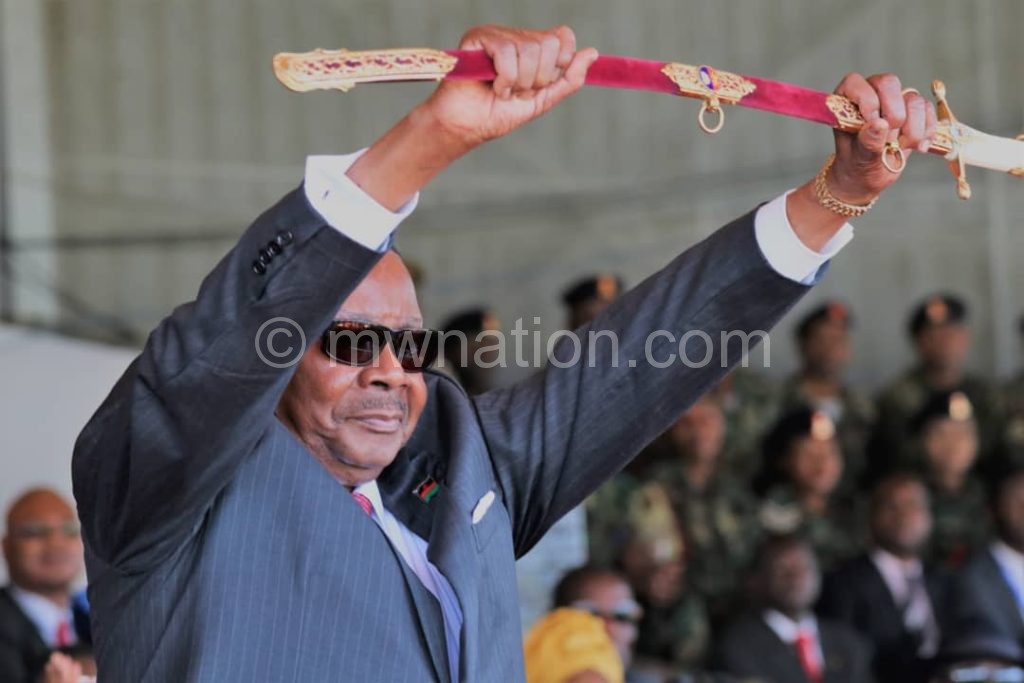30 independent MPs meet Mutharika

President Peter Mutharika on Saturday moved to boost the strength of his Democratic Progressive Party (DPP) in Parliament when he hosted 30 independent legislators at Sanjika Palace in Blantyre, coaxing them to join his party’s fold.
In an interview yesterday, presidential press secretary Mgeme Kalilani confirmed that the President met 30 of the newly-elected independent members of Parliament (MPs) at the presidential palace.
He said: “I can indeed confirm that about 30 independent MPs met Professor Peter Mutharika on Saturday at Sanjika Palace. These are people who would want to work with government.”
DPP spokesperson Nicholas Dausi, in a separate interview, said the governing party has an open-door policy and will welcome all those seeking to work with it.
“Politics is dynamic and the DPP has an open-door policy. All those that want to serve people are welcome to join us. People are elected to serve, it is a service to the community,” he said.
The independents who met Mutharika include Joseph Nomale who floored long-time legislator and ex-Cabinet minister Henry Mussa in Chiradzulu East, Ephraim Abele Kayembe of Dowa West and Mzimba West’s Billy Kaunda.
In the parliamentary race in the May 21 Tripartite Elections, DPP won 62 seats in the 193-seat National Assembly while Malawi Congress Party (MCP) and independents got 55 each. The other seats were shared as follows: United Democratic Front (UDF) 10 seats, People’s Party (PP) five, UTM Party four and Alliance for Democracy (Aford) one. Elections were held in 192 constituencies.
In a separate interview, Nomale confirmed attending the Sanjika meeting, saying as a legislator, he was already part of government as Parliament is one of the three arms of government.
He said: “It doesn’t matter which side of the House you sit, but as an MP, you are already part of the government. I have decided to work with government, I will support its policies.”
Kaunda, who defeated MCP second vice-president Harry Mkandawire, also said it is only by working with government that his area will develop.
“If you can go to Mzimba West, people will tell you that I promised to work with the government of the day, regardless of which party won the elections.
“My people want development and that comes from government; hence, the need to work with it. This relationship is mutual, the government needs me and I need it. It’s a win-win situation.”
Mzimba Luwerezi’s Sam Chirwa, who did not attend the Saturday meeting, also declared his interest to work with government.
The newly-elected legislator, who is husband to former Cabinet minister Grace Chiumia, said he was the first to express interest to work with government.
Yona Mkandawire of Rumphi West said he was approached by both DPP and MCP, but said he was still weighing his options.
He said: “I have been approached by both parties and I am holding meetings with my chiefs to help me make a decision.”
But while the 30 independents add to DPP’s 62 MPs, giving the party 92 representatives, the party still falls short of the two-thirds majority (128 MPs) required to pass constitutional amendments.
In the previous Parliament between 2014 and March 2019, DPP entered into a working relationship in Parliament with UDF to boost its numbers.
However, yesterday, both parties said they were yet to discuss the issue.
UDF secretary general Kandi Padambo said his party would be meeting this week to map the way forward.
He said: “It is after the meeting that we will be able to have a position on whether to continue working with the DPP.”
Dausi, on the other hand, said Mutharika has already stated his willingness to work with other parties to develop the country.
He said: “As for our partnership with the UDF, the same policy applies. We are ready to work with anybody who wants to work for the betterment of this country.”
Reacting to the developments, Mustafa Hussein, who teaches political and administrative studies at the University of Malawi’s Chancellor College, said greed influences most of the movements among independent legislators.
“It’s a wrong perception that if you belong to a governing party, you get development forgetting that people decided otherwise. Many say they have consulted, but they don’t.
“If people wanted party representatives, they could have elected them at the ballot. But they chose independents.
“Independents tend to join the governing party because they think development will come from it. There is also the desire for self-enrichment,” he said.
Election results since 1994 show a surge of independent MPs who, however, join the governing party once in Parliament.
There was no independent MP elected in the 1994 elections, then four got elected in 1999; the number shot to 38 in 2004 and to 32 in the 2009 elections. In the 2014 elections, there were 52 independents.
In a 2017 report commissioned by the Norwegian Ministry of Foreign Affairs, governance and rights researcher Arne Tostensen suggested that the number of independent candidates is growing due to controversies surrounding primaries.
In the report, Malawi: A Political Economy Analysis, Tostensen noted that although independents are not deemed to have crossed the floor, some of them later shed their independent status and join the incumbent party or opposition parties.
“These manoeuvres illustrate that politicians are opportunistic in conformity with the prevailing political elite culture when drifting towards the perceived locus of power and sources of wealth,” he said.
Parliament has set June 17 and 18 as dates for swearing in the 2019-2019 cohort of legislators.
Clerk of Parliament Fiona Kalemba said in a statement that the legislators’ oath of office will be followed by election of the House’s Speaker, First Deputy Speaker and Second Deputy Speaker.





